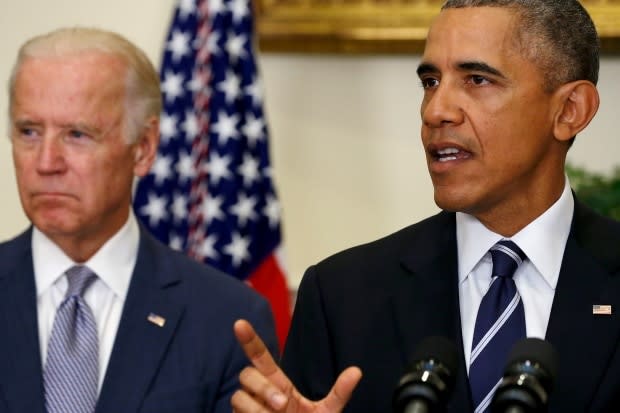Canadian oil is now a U.S. election issue
You can count the reasons some Canadians might now find themselves more heavily invested in this U.S. presidential election than they already were.
Say, about 1.5 billion more reasons.
That's the number of dollars Alberta taxpayers are investing as an equity stake in the Keystone XL oil pipeline, whose fate might now hinge on the U.S. election.
Presumptive Democratic nominee Joe Biden announced Monday he'd scrap the pipeline if elected, making the Alberta-to-Texas project a campaign issue.
"The province of Alberta is now an owner of this pipeline," said Dennis McConaghy, former vice president of the company building Keystone XL, now known as TC Energy. He was referring to the Alberta government's minority investment in the project, announced in March.
"So all Albertans have a real stake in this."
He called Biden's election a late-stage risk to the completion of the project; construction has just begun on an anticipated two- to three-year building phase, amid more than a decade of on-again-off-again legal and political battle.
McConaghy warned that there will be more lawsuits if Biden tries killing it, and he cautioned the pipeline fight could last well past the election.
Why that announcement
One possible reason for the announcement now: Biden is currently working to consolidate the support of skeptical progressives as he moves into the general election.
He's set up task forces to build the party platform with supporters of Sen. Bernie Sanders; the climate-change group, for instance, includes Alexandria Ocasio-Cortez, the first-term lawmaker who's boosted the so-called Green New Deal and blasted Keystone XL.
Biden has also promised to rejoin the Paris climate accord on his first day in office, and might now point to his anti-pipeline position in the context of that debate.
"We are in the political season," Bruce Heyman, Barack Obama's ambassador to Canada, told CBC News, acknowledging that, in an election year, a candidate's every gesture gets interpreted as campaign-related.
"But I think … he's clarifying the positions he believes in."
He said Biden is simply upholding the same conclusion Obama drew after a years-long, oft-delayed deliberation — that the project offers little benefit to the U.S., in terms of jobs and fuel prices, while undermining the transition to green energy.
Project proponents have contested those conclusions. Even Obama's State Department at the time downplayed the climate impact, noting in environmental assessments that the proposed pipeline would likely not alter global greenhouse gas emissions.
Pipeline packs less political punch
This pipeline was, for a few years, the hottest Canada-U.S. political issue, and a high-profile irritant on both sides of the border.
That's changed.

In Washington, it's become a lower-tier political topic, underscored Monday by the few U.S. news headlines and minimal reaction to Biden's announcement.
The U.S. capital is now consumed by hyper-charged new debates about relations with China; the pandemic; and the future of global trade.
Canadian politicians are also less keen to elevate the issue these days.
Under Stephen Harper, Canada mounted a multimillion-dollar ad campaign to pressure the Obama administration — with subway posters, and broadcast and Internet spots, arguing the pipeline would create jobs, not carbon emissions.
Both the federal and provincial governments responded Monday with measured statements that avoided criticizing Biden.
Alberta Minister Sonya Savage said she wasn't interested in speculating about potential U.S. election outcomes.
She said she would simply remind Americans of the project benefits: thousands of shovel-ready jobs at a time of mass unemployment, and a stable oil supply at a time of global instability.
Canadian politicians may also have domestic political incentives for avoiding a scrape with Biden now, in the midst of a hard-fought U.S. election.
Canadians' view on U.S. election
Canadians are massively rooting for Biden against President Donald Trump, says one pollster. David Coletto at Abacus Data said he doesn't see the pipeline being the issue that turns Canadian opinions on this election.
Coletto just completed an online survey of 1,727 Canadians, from May 14-17, which showed they favoured Biden by 56 percentage points against Trump (78 per cent to 22 per cent).
As for Keystone XL, his last poll on the topic was conducted three years ago and it showed qualified support for the pipeline: among 2,036 Canadians polled, 33 per cent approved of Keystone XL; 25 per cent opposed it, and 25 per cent said they could support it under the right conditions.
"While Biden's position on Keystone XL may lose some fans, Trump's negatives far outweigh Biden's in most people's minds," Coletto said.
"Biden would have to do a lot more for Canadians to want Mr. Trump re-elected over him. … I don't think this fundamentally changes anything [in Canadian opinion]."
Hillary Clinton and Obama opposed Keystone and most Canadians like them too, Coletto said.
Heyman said Canadians would also get along just fine with a President Biden.
"There's nobody who's going to be a better friend to Canada than Joe Biden," Heyman said.
"And that will be a stark difference from what you've experienced over these last few years [under Trump]. …
"[He won't be] threatening you with steel and aluminum tariffs. Threatening you with troops at your border. Threatening you with holding critical supplies during a pandemic."

